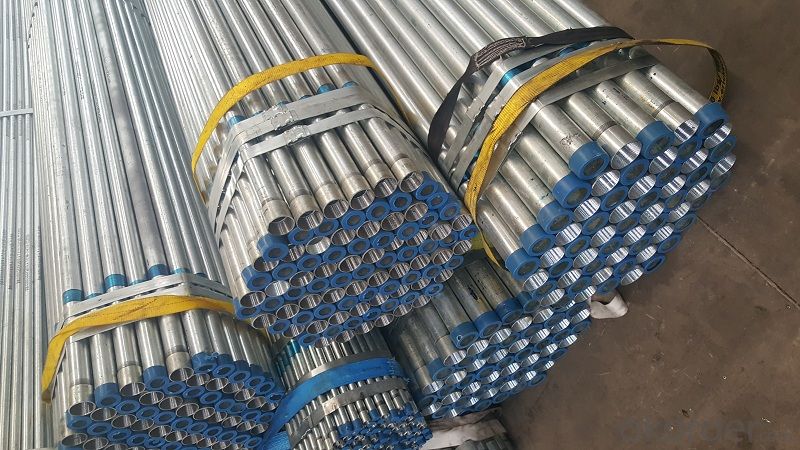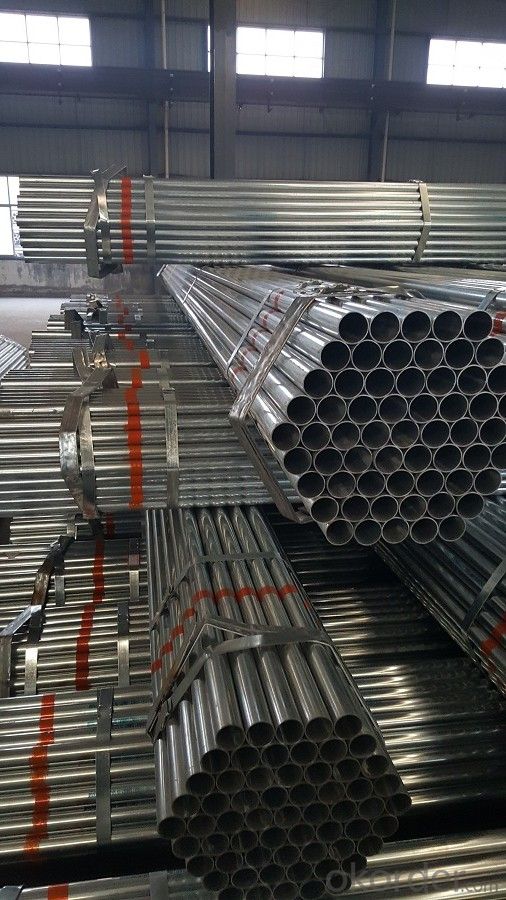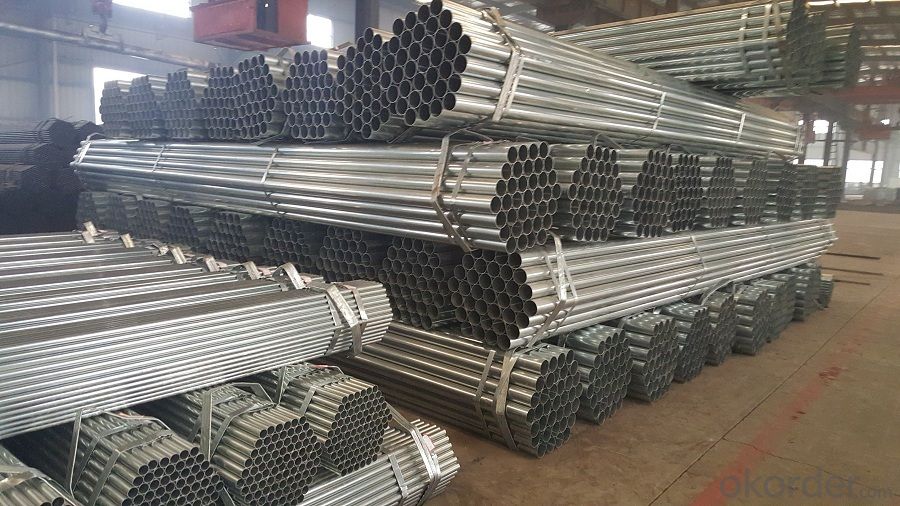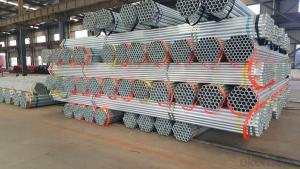Galvanized welded steel tubes for mechanical materials
- Loading Port:
- Tianjin
- Payment Terms:
- TT OR LC
- Min Order Qty:
- 10 m.t.
- Supply Capability:
- 14000 m.t./month
OKorder Service Pledge
OKorder Financial Service
You Might Also Like
Item specifice
1、Structure of Galvanized welded steel tubes for mechanical materials
The surface of galvanized steel pipe welded steel pipe of hot dip galvanized layer or. Galvanized can increase the corrosion resistance of the steel tube, prolong service life. Galvanized pipe is widely used, in addition to water, gas, oil and other general low pressure fluid pipelines. It is also used in the petroleum industry, especially for offshore oil field of oil well pipe and oil pipe, chemical, coking equipment of oil heater, condensation cooler, coal run oil exchanger tube, and trestle pile, the mine tunnel support frame tube.
2、Main Features of Galvanized welded steel tubes for mechanical materials
:
• High manufacturing accuracy
• High strength
• Good visual effect
• Reasonable price
3、 Galvanized welded steel pipe for building materials Specification:
Standard | GB, DIN, ASTM ASTM A106-2006, ASTM A53-2007 |
Grade | 10#-45#, 16Mn 10#, 20#, 45#, 16Mn |
Thickness | 1 - 33 mm |
Section Shape | Round |
Outer Diameter | 21 - 610mm |
Place of Origin | Tianjin, China (Mainland) |
Secondary Or Not | Non-secondary |
Application | Hydraulic Pipe |
Technique | Cold Drawn |
Certification | API |
Surface Treatment | factory state or painted black |
Special Pipe | API Pipe |
Alloy Or Not | Non-alloy |
Length | 5-12M |
Outer Diameter | 21.3-610mm |
Grade | 20#, 45#, Q345, API J55, API K55, API L80, API N80, API P110, A53B |
Standard | ASME, ASTM |
1) Material:Q195 Q235 Q345 X42 X52
2) Specification range:OD:21.3-610mm,WT:6-70mm,length:6-12m or according to the requirement of clients.
3) Excutive standards:GB,ASME API5L.ASTM A 106/A53,Despite of the above standards,we can also supply seamless steel pipe with standard of DIN,JIS,and so on,and also develop new products according to the requirements
4、Packaging & Delivery
Packaging Details: | seaworthy package,bundles wrapped with strong steel strip |
Delivery Detail: | 15-30days after received 30%TT |
5、FAQ of Galvanized welded steel pipe for building materials :
①How is the quality of your products?
Our products are manufactured strictly according to national and internaional standard, and we take a test
on every pipe before delivered out. If you want see our quality certifications and all kinds of testing report, please just ask us for it.
Guaranteed: If products’ quality don’t accord to discription as we give or the promise before you place order, we promise 100% refund.
②How about price?
Yes, we are factory and be able to give you lowest price below market one, and we have a policy that “ for saving time and absolutely honest business attitude, we quote as lowest as possible for any customer, and discount can be given according to quantity”,if you like bargain and factory price is not low enough as you think, just don’t waste your time.Please trust the quotation we would give you, it is professional one.
6、 Galvanized welded steel pipe for building materials Images:



- Q:How are steel pipes used in the manufacturing of food and beverage processing plants?
- Steel pipes are commonly used in food and beverage processing plants for various purposes such as transporting liquids, gases, and steam. They are used to create a network of pipelines that facilitate the movement of raw materials, ingredients, and finished products throughout the manufacturing process. Steel pipes are chosen for their durability, corrosion resistance, and ability to withstand high pressure and temperature conditions, ensuring the safety and efficiency of food and beverage production.
- Q:How are steel pipes used in the construction of stadiums and arenas?
- Steel pipes are commonly used in the construction of stadiums and arenas for various purposes. They are primarily used for the structural framework, supporting the weight of the building and providing stability. Steel pipes are also used for the installation of HVAC systems, electrical wiring, and plumbing, allowing for efficient distribution of utilities throughout the facility. Additionally, steel pipes are utilized for the construction of handrails, fences, and barriers, ensuring safety and security for spectators.
- Q:How are steel pipes used in sewage systems?
- Steel pipes are commonly used in sewage systems due to their durability and strength. They are used to transport sewage from homes, businesses, and industries to treatment plants or disposal sites. Steel pipes are able to handle the corrosive nature of sewage and are resistant to various chemicals and pressure. Additionally, they are also used for the construction of manholes, pumping stations, and other sewage system infrastructure.
- Q:How are steel pipes used in the manufacturing of chemical storage tanks?
- Steel pipes are commonly used in the manufacturing of chemical storage tanks as they provide structural support and serve as conduits for the transportation of chemicals. These pipes are typically used for connecting various components of the tank, such as the inlet and outlet valves, as well as for creating the internal plumbing system. The durability and corrosion resistance of steel make it an ideal material for ensuring the integrity and longevity of chemical storage tanks.
- Q:Can steel pipes be used for oil refinery applications?
- Yes, steel pipes can be used for oil refinery applications. Steel pipes offer many advantages for oil refinery applications including high strength, durability, and resistance to corrosion. They are able to withstand high pressure and temperature conditions that are common in oil refinery operations. Steel pipes are also easy to transport and install, making them a popular choice for oil refinery projects. Additionally, steel pipes can be customized to meet specific requirements such as size, thickness, and coating, making them suitable for a wide range of oil refinery applications.
- Q:What is the difference between internal and external coating for steel pipes?
- A protective layer is applied to the inner surface of steel pipes, which is known as internal coating. The main purpose of this coating is to prevent corrosion and enhance resistance against chemicals present in the fluid being transported. Techniques like spraying, brushing, or dipping are commonly used to apply the internal coating, and it can be made of materials such as epoxy, polyurethane, or cement mortar. On the contrary, external coating involves the application of a protective layer on the outer surface of steel pipes. The main objective of this coating is to protect against environmental factors like corrosion, abrasion, and impact. External coatings are usually applied through methods like wrapping or coating with materials such as polyethylene, fusion-bonded epoxy, or asphalt enamel. To summarize, the primary difference between internal and external coating for steel pipes lies in their location and purpose. Internal coatings safeguard the inner surface from corrosion and chemical attacks, while external coatings provide protection against environmental damage on the outer surface. Both types of coatings are essential to ensure the durability and reliability of steel pipes in various applications.
- Q:What is the production process of seamless steel tube?
- Main production process of cold rolled (drawn) seamless steel tube:Blank preparation, pickling, lubrication, cold rolling (drawing), heat treatment, straightening, finishing and inspectionThe production process of seamless steel tube in general can be divided into two kinds of hot rolling and cold drawing, cold-rolled seamless steel pipe production process than hot-rolled billet to complex, first to three roller rolling and extrusion to sizing test, if the tube through the cutting machine cutting surface without crack growth response after cutting blank about one meter. Then enter the annealing process, annealing and pickling to use acid pickling liquid, should pay attention to the surface if there are a lot of bubbling, if there are a large number of bubbling pipe shows that the quality is not up to the standard. The appearance of cold rolling seamless steel tube shorter than hot-rolled seamless steel pipe, cold rolled seamless steel pipe wall thickness is generally higher than hot-rolled seamless steel pipe to be small, but the surface looks better than thick wall seamless steel pipe is more bright, rough surface is not too much, not too much burr diameter.
- Q:How do you calculate the pipe thermal expansion for steel pipes?
- To calculate the thermal expansion of steel pipes, you can use the formula: ΔL = α * L * ΔT, where ΔL represents the change in length, α is the coefficient of thermal expansion for steel, L is the original length of the pipe, and ΔT is the change in temperature.
- Q:How are steel pipes classified based on their end connections?
- Steel pipes can be classified based on their end connections into three main categories: threaded, socket-weld, and butt-weld.
- Q:What is the difference between carbon steel pipes and stainless steel pipes?
- The main difference between carbon steel pipes and stainless steel pipes lies in their composition. Carbon steel pipes are primarily made of iron and carbon, while stainless steel pipes contain iron, carbon, and a minimum of 10.5% chromium. This chromium content in stainless steel pipes creates a protective layer of chromium oxide on the surface, making them highly resistant to corrosion. On the other hand, carbon steel pipes are more susceptible to corrosion and require additional coatings or treatments to prevent rusting. Additionally, stainless steel pipes offer better heat resistance and can withstand higher temperatures compared to carbon steel pipes.
1. Manufacturer Overview |
|
|---|---|
| Location | |
| Year Established | |
| Annual Output Value | |
| Main Markets | |
| Company Certifications | |
2. Manufacturer Certificates |
|
|---|---|
| a) Certification Name | |
| Range | |
| Reference | |
| Validity Period | |
3. Manufacturer Capability |
|
|---|---|
| a)Trade Capacity | |
| Nearest Port | |
| Export Percentage | |
| No.of Employees in Trade Department | |
| Language Spoken: | |
| b)Factory Information | |
| Factory Size: | |
| No. of Production Lines | |
| Contract Manufacturing | |
| Product Price Range | |
Send your message to us
Galvanized welded steel tubes for mechanical materials
- Loading Port:
- Tianjin
- Payment Terms:
- TT OR LC
- Min Order Qty:
- 10 m.t.
- Supply Capability:
- 14000 m.t./month
OKorder Service Pledge
OKorder Financial Service
Similar products
New products
Hot products
Related keywords































